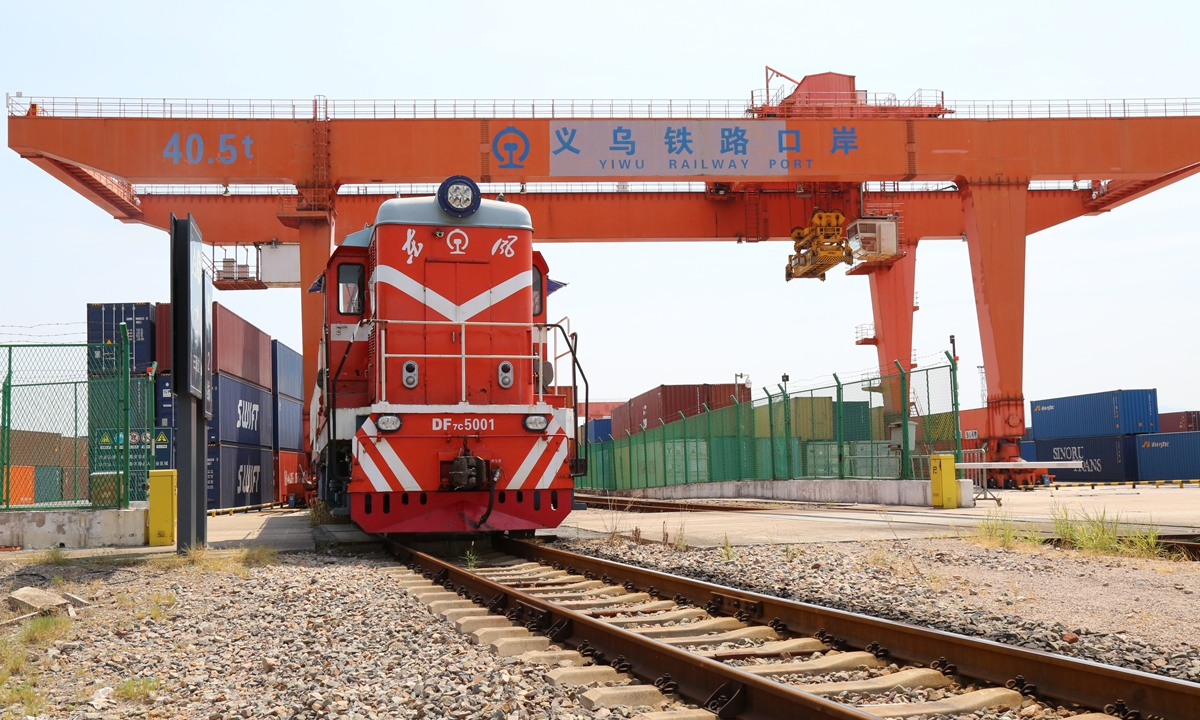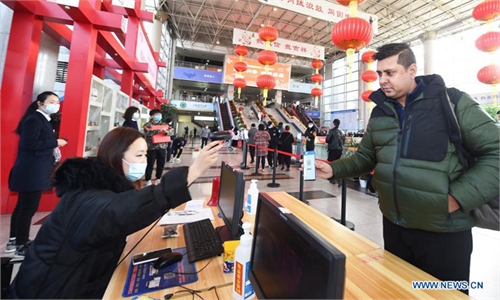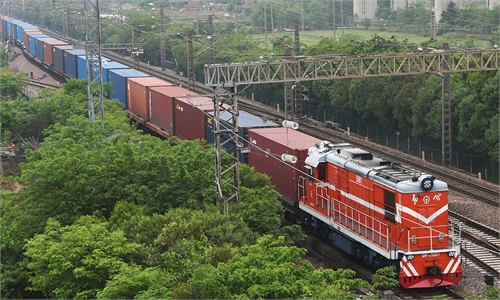
A China-Europe freight train departs from the Yiwu Railway Port and heads to Europe. Photo: Courtesy of Yiwu Customs
Chinese export hub Yiwu, East China's Zhejiang Province lifted "static management" on Sunday after bringing the recent epidemic outbreak in early August under control. Officials, traders are ramping up contingency measures to secure shipments and feel upbeat about the export outlook in the second half of the year.
Yiwu announced the reopening of wet markets, supermarkets, convenience stores, laundries and other basic services, 10 days after it imposed the static management on August 11. Gyms, theaters, internet cafe and dine-in services remain closed.
A Yiwu-based export trader surnamed Wang from Yiwu International Trade Market said that she is glad to get back to work and is ramping up efforts to deliver goods as the trade market has turned to its former hustle and bustle.
"Our customers have been pressing us to deliver the goods. The first thing I do after the reopening is to make the delivery, sort out the orders and go to the bank," Wang told the Global Times on Sunday.
According to Wang, a short break wasn't a big blow on her business and overall export business in Yiwu.
"Many of the Yiwu traders have factories and warehouses in other places outside Yiwu. There has been no major backlog of goods as we could still ship goods during the static management," Wang said.
Yiwu is one of the world's largest grocery commodity wholesale markets, bringing together more than 2.3 million commodities, which are sold to more than 210 countries and regions.
Yiwu Shengfan Import and Export Co told the Global Times that the company has been receiving a number of phone calls from regular customers over the past few days.
"The volume of business is picking up and recovering steadily. We expect more business after the customers get their goods ready," an employee from the company told the Global Times on Sunday.
During the height of the epidemic, Yiwu, a key stop on the China-Europe railway line has actively coordinated the railway capacity to ensure international delivery. It has operated 66 freight China-Europe freight trains from August 2 to August 16, up 59.4 percent from the previous month. Despite the complex international outlook, rising international shipment fees and sporadic outbreaks in some Chinese cities, traders including Wang are optimistic about the business outlook this year.
Wang said that her business, which exports rain coats to Southeast Asia and South America, is expected to surpass that of last year.
To bailout the business, the local government of Yiwu rolled out a number of stable measures, including giving a maximum of 1 million yuan ($146,000) in rewards to encourage export, according to a local government announcement on Saturday.
To boost foreign trade, Yiwu will give a one-time reward of 200,000 yuan, 500,000 yuan and one million yuan respectively to foreign trade enterprises whose annual export reaches 1 billion yuan, 5 billion yuan and 10 billion yuan for the first time, according to a number of stable measures issued by the local government on Friday.
In terms of fiscal policies, local government has announced to issue 20,000 yuan reward for companies with 15 percent year-on-year increase in revenue in the third quarter.
Logistics enterprises that carry more than 2,000 TEUs in Yiwu from July to December will be given subsidy of 60 yuan per TEU.
According to current statistics, Yiwu has a total of 821 large-scale enterprises and the work resumption rate has reached more than 85 percent, Yiwu business journal reported Sunday. The industrial electricity consumption had recovered to 90 percent of pre-pandemic levels after five consecutive day growth, data showed.
China's export growth picked up speed in July, revealing an encouraging boost to the economy. Exports rose 18.0 percent in July from a year earlier, according to official customs data.



